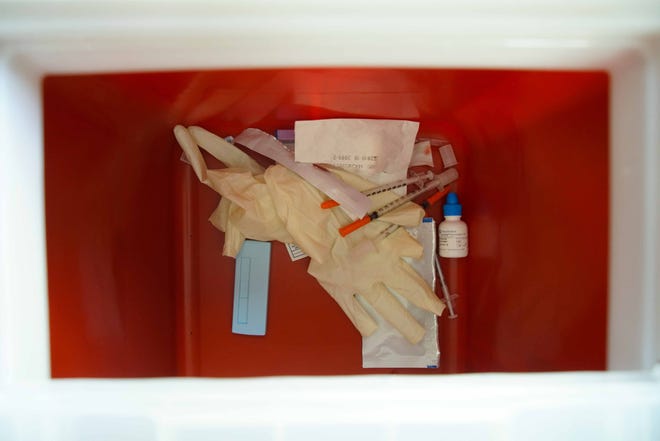2021 was been tough and unforgiving. Almost everyone has a survival story to share. Some are not so lucky — lives lost to COVID-19, suicide, and substance abuse are all part of our current reality. The pandemic brings related stress and fear that we all must manage. For us at Brandywine Counseling and Community Services, we help others navigate this additional stress while they battle their addictions.
I’m so proud of our process at BCCS. Our patients are living proof that providing unconditional acceptance and meeting critical needs can lead to bigger changes and a better quality of life. This is why one of the first steps in helping those trying to overcome an addiction is making their environment as safe as possible. This means reducing or eliminating dangerous factors that could be additionally harmful to them and the community in which they live. This practice is known as harm reduction.
For those battling addictions to drugs that need syringes, overdosing is not their only threat. Infectious diseases like Hepatitis C and HIV are very real threats. This is because the accidental transmission of even a single droplet of blood on a used syringe can be as fatal as the substances being injected. And when users inject several times a day with the same syringe, and share those needles, the likelihood of getting one of these diseases is compounded. But what if, instead of reusing that syringe, users could exchange it for a new, unused one from a trusted source?
Exchanging syringes, saving lives
Bringing hope, offering support and helping save lives is why we created the Syringe Services Program, a judgement-free service that takes used syringes out of circulation and literally off the streets, protecting both the user and their community from the serious potential harm of reused or cast-off syringes. Since the creation of the program, we’ve collected, exchanged, and destroyed more than 950,000 potentially infectious syringes.
As we help save lives, we help save the state of Delaware money. The SSP program costs around $200,000 per year to run. Meanwhile, just one HIV-positive patient can incur medical expenses of $435,000 a year, according to a study conducted by Cornell University. Through SSP, we’re taking used syringes off the streets, helping stop disease transmission, and providing to users health and counseling support they can rely on.
Not just syringes; service
According to the Centers for Disease Control and Prevention, users who visit a syringe exchange program like SSP are five times more likely to enter a treatment facility. During our BCCS syringe services program outreach, we’re not simply removing used syringes, we’re creating connections with people who would not normally be exposed to care. We have made 66,000 referrals to substance abuse treatment and directly connected over 1,200 individuals directly to care. We want to know how they might be feeling, not just about their addiction. We let them know that change is good, that we care and are here to help when they’re ready. We provide lifesaving naloxone and referrals to community services, as well as to online resources helping combat the opioid crisis like the state’s own website, HelpIsHereDE.com.

Our mission at BCCS is to help communities flourish. We do what has to be done. We do the difficult work. We make neighborhoods stronger, safer and healthier. We work with the entire population because prevention and behavioral services do not, and cannot, differentiate between social classes. If you, or someone you know, is struggling with substance abuse, please do not hesitate to reach out to me — personally. Because that is what addiction is — it is personal.
Lynn Morrison is president and CEO of Brandywine Counseling and Community Services.
FYI Sources:
https://www.aclu.org/fact-sheet/needle-exchange-programs-promote-public-safety
https://www.cdc.gov/ssp/syringe-services-programs-summary.html
https://www.cdc.gov/ssp/syringe-services-programs-faq.html